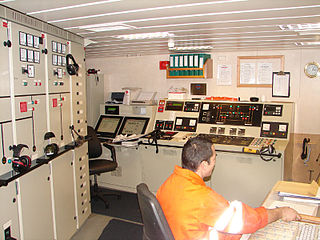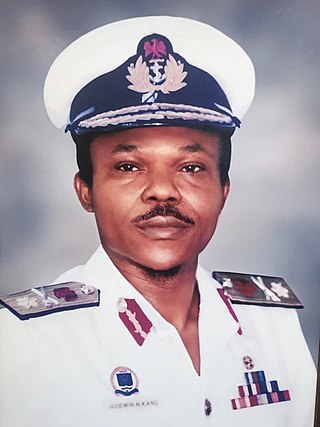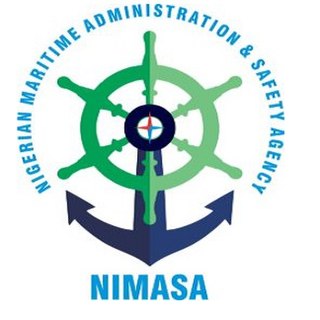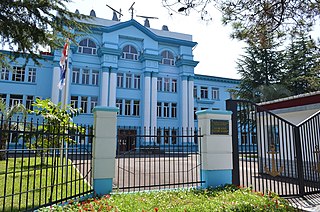Related Research Articles

Nigeria’s transport network has expanded in recent years to accommodate a growing population. The transport and storage sector was valued at N2.6trn ($6.9bn) in current basic prices in 2020, down from N3trn ($8bn) in 2019, according to the National Bureau of Statistics (NBS). This was reflected in a lower contribution to GDP, at 1.8% in the fourth quarter of 2020, down from 2.1% during the same period the previous year but higher than the 0.8% recorded in the third quarter of 2020. One of the most significant challenges facing the sector is meeting the needs of both large coastal cities and rural inland communities in order to fully unlock the country’s economic potential. This is especially the case with mining and agriculture, both of which are expected to benefit from two large-scale projects: the Lekki Port in Lagos and the Kano-Maradi rail line in the north of the country.

An engine department or engineering department is an organizational unit aboard a ship that is responsible for the operation, maintenance, and repair of the propulsion systems and the support systems for crew, passengers, and cargo. These include the ship engine, fuel oil, lubrication, water distillation, separation process, lighting, air conditioning, and refrigeration.

A third mate (3/M) or third officer is a licensed member of the deck department of a merchant ship. The third mate is a watchstander and customarily the ship's safety officer and fourth-in-command. The position is junior to a second mate. Other duties vary depending on the type of ship, its crewing, and other factors.

An oiler is a worker whose main job is to oil machinery. In previous eras there were oiler positions in various industries, including maritime work, railroading, steelmaking, and mining. Today most such positions have been eliminated through technological change; lubrication tends to require less human intervention, so that workers seldom have oiling as a principal duty. In the days of ubiquitous plain bearings, oiling was often a job description in and of itself.
The Myanmar Mercatile Marine College (M.M.M.C), located in Yangon, Myanmar, is a public institute offering mainly two-year diplomas in mercantile nautical technologies. The institute also offers four-year bachelor's degrees and post-graduate diplomas in select fields.

Greece–Nigeria relations are the bilateral relations between Greece and Nigeria. Nigeria has an embassy in Athens. Greece established a diplomatic mission in Nigeria in 1970, and today has an embassy in Abuja and a consulate in Lagos. Trade between the two countries is imbalanced, with imports from Greece to Nigeria exceeding exports. Greek-owned tankers have an important role in shipping Nigerian oil and natural gas, its main exports. In 2008, a Greek tanker was involved a dispute over crude oil smuggling. Greek-controlled companies have invested US$5 billion in the Nigerian economy. There is a small Greek business community in Lagos.

Ndubuisi Godwin Kanu was a Nigerian military officer and state governor. Early in his career, he fought for the Biafran side in the Nigerian Civil War and in July 1975 he was appointed to Murtala Muhammed's Supreme Military Council. After military president Olusegun Obasanjo came to power Kanu was appointed military governor of Imo State and then Lagos State. Returning to the military, he served with the United Nations Interim Force in Lebanon. In retirement, he was a pro-democracy campaigner and called for decentralisation of power and increased federalism.
Obafemi Anibaba is a Nigerian civil servant and businessman who was appointed Federal Minister of Works in March 2006 and was redeployed as Minister of Communications in September 2006 during the presidency of Olusegun Obasanjo.
Muftau Adegoke Babatunde Elegbede or Tunde Elegbede was Chief of Nigeria's Defence Intelligence Agency from July 1986 to January 1990 and Military Governor of Cross River State, Nigeria between July 1975 and October 1978.

The Federal College of Fisheries and Marine Technology is a higher education institute located on Victoria Island in Lagos, Nigeria. It is a monotechnic approved by the National Board for Technical Education. The College was originally known as the Federal School of Fisheries, established in 1969 as a vocational training institute for Nigeria's in-shore fishing fleet. It was upgraded to a technological institution in 1992. The college offers courses in fisheries technology, general science, marine engineering, nautical science and Maritime Transport and Business Management. It has two hostels, accommodating about 450 students.
Effiong Dickson Bob from Ikot Ekwere, Ubium in Akwa Ibom State is the Pro Chancellor of the University of Benin. He was elected Senator for the Akwa Ibom North East Senatorial District of Akwa Ibom State, Nigeria. He took office on 29 May 2003, and was re-elected in 2007 and served till 2011. He is a member of the People's Democratic Party (PDP).
The Namibian Maritime and Fisheries Institute (NAMFI) is a tertiary educational institution situated in Walvis Bay, Namibia. It was established in 1996 by the Ministry of Fisheries and Marine Resources. NAMFI provides maritime and fisheries training in accordance with the International Maritime Organization (IMO) and builds capacity in the field of maritime and fisheries sectors in and around Namibia.
The Nigerian Merchant Navy (NMN) consists of ships, their crew and supporting organizations owned by Nigerians and engaged in cabotage and international trade with Nigeria.

The Nigerian Maritime Administration and Safety Agency (NIMASA), formerly the National Maritime Authority (NMA) is responsible for regulations related to Nigerian shipping, maritime labor and coastal waters. The agency also undertakes inspections and provides search and rescue services. The governing board includes representatives of the Ministry of Labour, the Ministry of Transport and the Navy.

Batumi State Maritime Academy is an internationally accredited higher-education maritime school in Batumi, Georgia. The institution's main function is to prepare qualified staff for employment within the marine-trade fleet and maritime transport infrastructure. Batumi State Maritime Academy provides an educational process that is in accordance with Georgian legislation as well as the international STCW Convention.
The Escola Superior Náutica Infante D. Henrique or ENIDH is a state-run college of higher education dedicated to nautical studies, situated in Paço de Arcos, Oeiras, in the Portuguese district of Lisbon. Literally, the Prince Henry Nautical School, it was named for the Portuguese prince Henry the Navigator. It is the official Portuguese maritime college and specializes in maritime studies.

PNTC Colleges, formerly known as Philippine Nautical and Technological College, is a private, non-sectarian Higher Education Institution (HEI) and a Maritime Training Institution (MTI) in the Philippines.
Eli Jidere Bala is a Nigerian professor of Mechanical engineering and the Director-General of the Energy Commission of Nigeria.

The Electro-Technical Officer (ETO) is a licensed member of the engine department of a merchant ship as per Section A-III/6 of the STCW Code.
References
- ↑ "About: Maritime Academy of Nigeria". maritimeacademy.gov.ng. Retrieved 2020-05-30.
- ↑ "Maritime Academy of Nigeria". Maritime Academy of Nigeria. Retrieved 2010-03-22.
- ↑ Austine Odo (10 April 2003). "Gov't to Build Jetty At Oron". Daily Trust. Retrieved 2010-03-22.
- ↑ Sopuruchi Onwuka (4 February 2010). "NLNG Boosts MAN Accreditation With N30 Million Facility". Daily Champion. Retrieved 2010-03-22.
- ↑ Godfrey Bivbere (15 February 2010). "NLNG Boosts Maritime Training Facilities". Vanguard. Retrieved 2010-03-22.
- 1 2 Onwuka Nzeshi (25 January 2010). "Maritime - Country Needs 50,000 Sailors". This Day. Retrieved 2010-03-22.
- ↑ "About us". nmulibrary.net. Retrieved 2024-01-26.
- ↑ Andrew Airahuobhor (15 April 2009). "Crossroads of Opportunities And Threats in Maritime Sector". Daily Independent (Lagos). Retrieved 2010-03-22.
- ↑ Godfrey Bivbere (10 January 2008). "NIMASA Justifies Establishment of Badagry Academy Despite Stakeholders Opposition". Vanguard. Retrieved 2010-03-22.
- ↑ "Nigeria: Rector Explains Admission Constraints at Maritime Academy". Daily Independent (Lagos). 8 October 2009. Retrieved 2010-03-22.
- ↑ "Courses Offered in Maritime Academy of Nigeria, Oron". Samphina Academy. 2019-08-05. Retrieved 2021-06-01.
- ↑ "Full List of Courses Offered In Maritime Academy of Nigeria (MARITIMEACADEMY)". ITSJAMBNEWS. 2020-10-31. Retrieved 2021-06-01.
- ↑ "List of Courses Offered at Maritime Academy of Nigeria (MARITIMEACADEMY)". Nigerian Scholars. 2020-01-01. Retrieved 2021-06-01.
- ↑ Andrew Airahuobhor (6 May 2009). "Nigeria: Maritime Academy And the Burden of Funding". Daily Independent (Lagos). Retrieved 2010-03-22.
- ↑ Paul Ogbuokiri (25 December 2009). "Dearth of Human Capital in the Maritime Industry". Daily Champion. Retrieved 2010-03-22.
- ↑ Andrew Airahuobhor (9 September 2009). "NSDP - 27 Nigerians Proceed On Seafarer's Training in India". Daily Independent (Lagos). Retrieved 2010-03-22.
- ↑ "Seafaring manpower deficit worry Senate, others". The Guardian Nigeria News - Nigeria and World News. 2020-12-31. Retrieved 2021-06-01.
- ↑ Ndubuisi Ugah (22 August 2009). "Groups Seek Probe of Maritime Academy". ThisDay. Retrieved 2010-03-22.